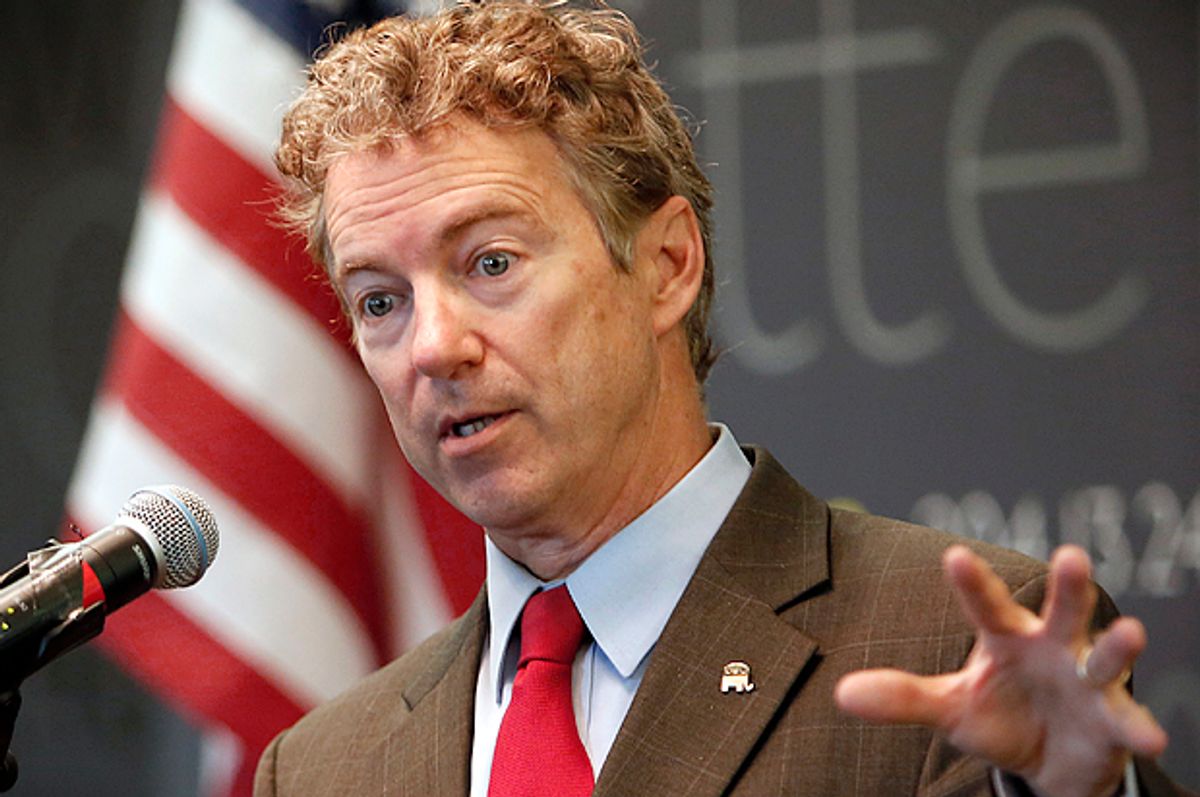Rand Paul has never been totally "against drones," despite the reputation he's received and oftentimes courted. He has questioned the constitutionality of targeting American citizens in drone strikes abroad. He has also, somewhat less heroically, stoked fear about the use of drone strikes against American citizens on American soil. That second bit is largely what Paul's "filibuster" of John Brennan's nomination as director of the CIA was about. After Attorney General Eric Holder dryly responded "no" to Paul's question about whether it would be legal for the president to "use a weaponized drone to kill an American not engaged in combat on U.S. soil," the Senate went ahead and confirmed Brennan.
Paul for years has successfully walked the line on all things "drone." He gets credit from his libertarian base for being "anti-drone" without going after the heart of the matter: the broad use of weaponized drones in counter-terrorism operations overseas. He'll raise concerns about the constitutionality of killing Anwar al-Awlaki, an American citizen, in a drone strike, but he's loathe to criticize the larger drone war in Pakistan, Yemen, Somalia, and everywhere else. ("Loathe to criticize" doesn't really do it justice: he's more than happy to take the lay-ups when the opportunity arises. When the Obama administration swapped five Taliban prisoners from Guantanamo Bay for Sgt. Bowe Bergdahl, Paul said that "there would be a drone with their name on it" if any of them resumed plotting attacks against the United States.)
After President Obama's announcement last week that drone strikes on a Waziristan compound killed an American and an Italian citizen taken hostage by Al Qaeda, as well as two American citizens who had joined Al Qaeda, Republicans and Democrats alike largely gave the administration a pass. There will be a perfunctory review of the incident, but it won't change the nature of the drone war. It's far too popular a means of killing suspected terrorists that nagging problems, like its constant killings of innocents, will be swept under the rug.
It was no surprise that Lindsey Graham and other hawks, who are big fans of American-sponsored killing overseas, would let the administration slide on this one. But what about Rand Paul, the supposed "anti-drone" Republican? Isn't this right in his wheelhouse -- or at least what used to be his wheelhouse?
The presidential candidate's early response was limited. "It is a tragedy that these Americans lost their lives," Paul's campaign said last Thursday. "My prayers and thoughts are with their families." It wasn't until this morning that Paul was finally pressed to give his opinion, and it took Fox News' morning cartoon show Fox and Friends to do the asking.
"I do think that there is a valuable use for drones and as much as I’m seen as an opponent of drones, in military and warfare, they do have some value,” Paul said. “I think this is a difficult situation. You have hostages being held; some of them are American. You have people holding hostages; some of them are American. I’ve been an opponent of using drones about people not in combat. However if you are holding hostages, you kind of are involved in combat. So I look at it the way it is in the United States. If there's a kidnapping in New York, the police don't have to have a warrant to go in."
Emphasis ours, because that's where the shift in position is: he no longer appears to care much about the constitutional due process rights of Americans who have joined Al Qaeda, as he did after the al-Awlaki episode. He would echo this new position later in his comments: "You really don't get due process or anything like that if you are in a war zone."
So: Rand Paul was never against the use of drones in the War on Terrorism generally. He was against the use of drones against American citizens in Al Qaeda, but now he has no problem with that. As Glenn Greenwald tweets, "if his big maverick view is now reduced to 'no drone killings of Americans on US soil,' it's hardly interesting."
Greenwald also questions Paul's larger strategy here of trying to tie up loose, dovish ends on foreign policy: "I don't get his strategy: he's never going to attract GOP hawks, so why dilute what makes him interesting/unique?" That's the big strategic oddity hanging over all of Paul's shifts to the right on foreign policy. There are now several politicians considering presidential runs and 501(c)(4)s being set up solely for the purpose of combating Rand Paul's allegedly "isolationist" views, even as Paul has fallen in line behind the GOP's more traditional, hawkish foreign policy. Why is Paul shedding what makes him unique and interesting on foreign policy, when the party's hawks aren't buying it anyway? Presumably he's looked at the post-beheadings data and found that whatever element of foreign policy restraint existed among a significant subset of Republican voters a couple of years ago is gone.
It's a shame, because there's never been a better opening for criticizing the Obama administration's protocol for drone strikes than right now. The administration, which by its own standards is supposed to have "near certainty" about who and what it's going after with lethal force, had no idea who it was droning in the January attack. It saw an Al Qaeda-looking guy walking into an Al Qaeda-looking compound, and so it fired some missiles at the compound. It did not know that Warren Weinstein was in there, and it did not know that the two Americans in Al Qaeda were in there. The administration would paint Weinstein's death as bad luck and the other two Americans' deaths as good luck. And now Rand Paul is right there with Lindsey Graham, providing cover.



Shares